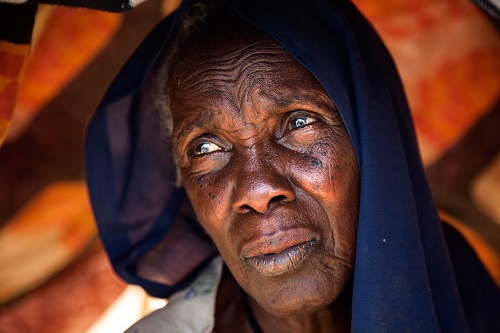
New photographs smuggled out of Darfur show uniformed Sudanese security forces brazenly assaulting Darfuris living in El Salam camp for the internally displaced. The camp, on the outskirts of Nyala in South Darfur, is host to tens of thousands who fled their homes due to violence. The recent assault was carried out last week under the pretense of a disarmament campaign. However, Abu Sharati, spokesman for the camp residents' association argues "the main objective of this attack is terrorising the camp population and dismantling the camp." Camps like El Salam serve as a vivid counterpoint to the Sudanese government's ongoing efforts to convince the international community that people are returning home to "model villages" and that things are returning back to normal in Darfur.
The photographs, which were taken on August 5, are available on Eric Reeves' website and show armed men in camouflage uniforms brandishing weapons and storming the camp. Other images, published by Radio Dabanga, catch government forces in the act of forcing camp residents to lay on the ground in submission. In an environment where international reporters are completely forbidden from operating, these photographs offer a glimpse into the indignities that Darfur's 2.5 million internally displaced face on a daily basis. However, these types of assaults are just the tip of the iceberg. Following the advent of the Rapid Support Forces, the past 12 months have seen a dramatic escalation in ethnic cleansing, violent displacement, gender based and sexual violence across the region.
In his post, Reeves worries that while UNAMID, the joint African Union and United Nations peacekeeping mission in Darfur, boasts in its most recent press release of its “ongoing efforts to protect civilians across Darfur […] no mention is made of El Salam or the countless other attacks on civilians, including those in displaced persons camps. The grim but inescapable fact is that UNAMID cannot provide even a minimal level of security for more than small parts of Darfur at any one time."
Meanwhile, in New York, the countries that contribute troops to the peacekeeping mission in Darfur met today to discuss the fate of the troubled mission. 38 countries contribute military personnel to the effort in Darfur but Rwanda, Ethiopia and Kenya provide the bulk of the troops. The joint mission to Darfur has been lambasted for failing to act to protect Darfur's civilians and for covering up those failures. In March of this year, the Satellite Sentinel Project captured images confirming that Rapid Support Forces torched a camp for the displaced right on UNAMID's doorstep. These very public accusations about the mission's failure to protect civilians in danger have led to the launch of a special investigation into the mission's track record.
The U.N. Security Council will vote to adopt a new mandate for UNAMID on August 26. In advance of that meeting, the Enough Project and five partner organizations have sent letters to the fifteen ambassadors on the Security Council asking for a new approach. Most notably, the letters asks the Council members to recognize the limitations of the Doha Document for Peace in Darfur, end UNAMID support for that process, and facilitate the launch of a new comprehensive "peace process for all of Sudan." Signed in 2011, the Doha Document, or DDPD, was deeply flawed from its inception since it sought to impose a peace without including the three most prominent Darfuri opposition groups. Since then, the three Darfuri rebel groups who did not sign on to the Doha Document joined with rebels from South Kordofan and Blue Nile to form the Sudan Revolutionary Front. In light of these new circumstances, consensus has emerged that the DDPD has failed. Continued UNAMID to support this process is actively counterproductive to the emerging efforts to find a comprehensive national solution to Sudan's problems.
TAKE ACTION: Make sure that your members of Congress know that Darfur is a still a priority for you. Many people refer to the conflict in the past tense, but the facts show the opposite. Join ordinary citizens from 50 states in our Decisive Action campaign to put Sudan back on the agenda for our elected officials.

